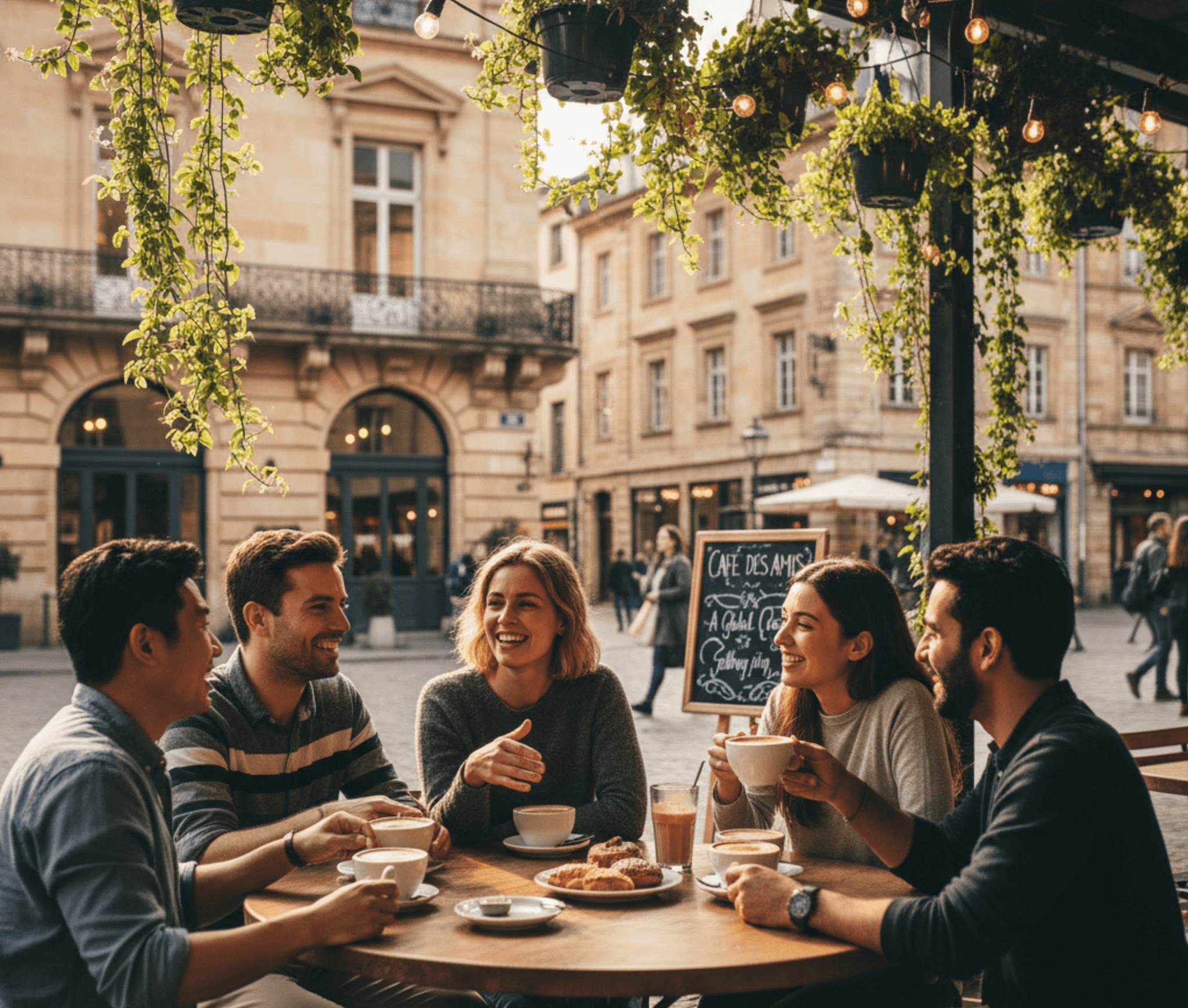Property Owners
Discover the Benefits of Expat Rentals
Rent out your apartment with Globexs


Rent out your apartment with Globexs



Thriving in your new city starts with understanding one truth: moving to a new place is one of life's most exciting adventures. But let's be honest — it can also feel overwhelming. Between navigating unfamiliar streets, understanding local customs, and building a new social circle, the first few months can test even the most adventurous spirit.
The good news? You're not alone, and adaptation is absolutely possible.
With over 300 million people now living outside their country of birth — a number that's tripled since 1970 — relocation has become a defining feature of modern life. And research shows that with the right approach, not only can you adapt successfully, but you can actually thrive in your new environment.
Here's your guide to making that happen.
First, let's normalize something important: adaptation takes time.
According to research on cultural adaptation, most people experience what's called the "U-curve" of adjustment:
1. The Honeymoon Phase (Weeks 1-4) Everything feels exciting and new. You're energized by discovery and novelty.
2. The Culture Shock Phase (Months 2-6) Reality sets in. You might feel frustrated, lonely, or question your decision to move.
3. The Adaptation Phase (6-12+ months) You develop strategies to navigate your new environment. Things start feeling more natural.
Here's what matters: On average, complete emotional adjustment takes 1-2 years. That's normal. That's expected. And knowing this timeline helps you be patient with yourself during the challenging moments.
Recent research from InterNations surveying over 12,500 expats across 175 nationalities revealed something crucial: social integration is the #1 factor in successful adaptation.
In fact, in countries rated highest for ease of settling in:
88% of people report feeling welcome (vs. 63% globally)
83% feel at home in their new environment (vs. 58% globally)
73% rate their social experiences positively
The data is clear: connection is everything.
Join Expat Communities Online forums, Facebook groups, and expat meetups provide instant access to people who understand exactly what you're going through. They can offer practical advice, recommend services, and become genuine friends.
Attend Regular Events Look for recurring gatherings — weekly language exchanges, monthly cultural events, sports clubs, or volunteer groups. The key word is "recurring." Seeing the same faces helps build real relationships.
Find Services That Prioritize Community
Here's something many people don't realize when choosing relocation support: not all services are created equal. While some companies stop at logistics — finding you an apartment and handling paperwork — others understand that successful relocation goes far beyond documentation.
For example, at Globexs, community isn't an afterthought — it's fundamental. As a client, you automatically become part of a built-in network of expats who are navigating the same journey. With events hosted twice a month, you're never starting from zero. From the moment you arrive, you have:
– Ready-made community: Other expats who understand exactly what you're going through
– Regular connection: Twice-monthly events mean you see familiar faces consistently
– Natural friendships: Shared experiences at events create bonds faster than random meetups
– Ongoing support: Not just during move-in week, but throughout your adaptation journey
This is what research means when it shows that structured, recurring social engagement dramatically improves adaptation outcomes. You're not alone trying to build a network from scratch — you're joining an established community from day one.
Say Yes (Even When It's Uncomfortable) That invitation to coffee? Say yes. The community event you're nervous about? Go anyway. Research shows that 69% of successfully adapted expats found it easy to make local friends — but only because they actively pursued opportunities.
Pro Tip: Many relocation services now recognise the importance of community and host regular social events for their clients. These gatherings create natural opportunities to meet others in similar situations, build friendships, and create the support system you left behind.
Cultural adaptation doesn't mean abandoning your identity. It means finding balance.
Learn Basic Language Skills You don't need fluency on day one, but learning common phrases shows respect and opens doors. Apps like Duolingo make this easy, and locals genuinely appreciate the effort.
According to the Foreign Service Institute, achieving "Professional Working Proficiency" takes:
600-750 hours for languages similar to your native tongue
1,100+ hours for more challenging languages
Start small. Even 15 minutes daily adds up.
Understand Local Rhythms Every city has its own pace. Some cultures prioritize punctuality; others embrace flexibility. Meal times vary. Social etiquette differs. Observe, ask questions, and adapt gradually.
Participate in Cultural Events Festivals, local celebrations, and community gatherings aren't just fun — they're windows into understanding your new home. Plus, they're excellent opportunities to meet people.
Create Familiar Routines Find your favorite coffee shop. Establish a Sunday market ritual. Build small traditions that make this new place feel like home while honoring where you came from.
Master the Basics Early
The faster you understand practical systems, the more confident you'll feel:
Local transportation (apps, routes, payment methods)
Banking and financial systems
Healthcare facilities and emergency numbers
Grocery shopping and local markets
Set Up Your Space Make your new accommodation feel like home. Photos, familiar items, comfortable furniture — these aren't luxuries, they're emotional anchors during transition.
Establish a Routine When everything feels chaotic, routine provides stability. Regular exercise, consistent sleep schedules, and familiar activities help ground you.
Stay Connected (But Not Too Connected) Video calls with loved ones back home are important, but don't let them prevent you from engaging with your new environment. Find balance.
Acknowledge Your Feelings Homesickness is normal. Frustration is normal. Missing familiar faces is normal. Don't judge these emotions — they're part of the process.
Practice Self-Care According to research on expat mental health:
Regular exercise reduces adaptation stress
Adequate sleep supports emotional resilience
Healthy eating stabilizes mood
Mindfulness practices help manage overwhelm
Celebrate Small Wins Ordered coffee in the local language? Victory. Navigated public transport solo? Amazing. Made a new friend? Huge. Every step forward counts.
Seek Support When Needed If feelings of loneliness, anxiety, or depression persist beyond normal adjustment periods, reach out. Many cities offer mental health services for expats, and online therapy makes professional support accessible from anywhere.
Based on research and thousands of expat experiences, here's a realistic timeline:
Month 1-3: Daily Routines You'll figure out practical logistics — where to shop, how to get around, basic services.
Month 6-12: Cultural Understanding You'll start grasping local customs, social norms, and unwritten rules.
Year 1-2: Complete Adjustment You'll feel genuinely at home, with established friendships and comfortable routines.
Remember: Progress isn't linear. Some days will feel like setbacks. That's part of the journey.
Here's something powerful from recent research: expats who participate in regular community activities report significantly lower loneliness and higher life satisfaction than those who don't.
What does "regular" mean? Studies show the most successful pattern is:
Twice-monthly gatherings with the same group
Structured activities (not just random meetups)
Mixed formats (social events, cultural outings, practical workshops)
This creates:
Continuity (seeing familiar faces)
Low pressure (events are scheduled, you just show up)
Real relationships (shared experiences build bonds)
Practical support (people who understand your challenges)
Many forward-thinking relocation services now build this into their offerings — not as an "extra," but as essential support. Because research proves it works.
Ready to start thriving? Here's your roadmap:
Week 1: Explore and Observe
Walk your neighborhood daily
Locate essential services
Notice local rhythms and customs
Be a curious observer
Week 2: Establish Routines
Find your regular coffee shop
Set exercise schedule
Create morning/evening rituals
Build structure into your days
Week 3: Make Connections
Join one expat group online
Attend one community event
Strike up one conversation with a neighbor
Say yes to one invitation (even if nervous)
Week 4: Deepen Integration
Sign up for a regular activity (language exchange, sports team, volunteer work)
Try one new local tradition or food
Schedule regular check-ins with new contacts
Set personal goals for Month 2
Here's what research on successful expats reveals: 94% of people who fully engage with their adaptation process report being happy with their life abroad.
Not just "okay." Happy.
Why? Because moving to a new city — despite its challenges — offers something extraordinary:
Personal Growth You become more resilient, adaptable, and culturally aware. You discover strengths you didn't know you had.
Expanded Perspective Living in a different place reshapes how you see the world. You gain insights impossible from tourism or staying in one place.
Authentic Connections The friendships you build while navigating a new city together often become some of the deepest relationships of your life.
Renewed Appreciation Both for your new home AND your place of origin. You see beauty in both with fresh eyes.
Moving to a new city is undeniably challenging. The first months can feel lonely, frustrating, and overwhelming.
But here's what over 300 million people living abroad have discovered: it gets better.
Not magically. Not immediately.
But with intention, patience, and the right support — it absolutely gets better.
Remember:
Adaptation takes 1-2 years (be patient with yourself)
Community is crucial (prioritize connection)
Small steps compound (celebrate every win)
You're more resilient than you think (you've already proven this by moving)
Your new city is waiting to become home. Not the home you left — a different home. One with new traditions, new friends, new favorite places, and new memories.
Give yourself time. Seek community. Stay curious. And trust the process.
Thousands of people before you have walked this path. They made it through the challenging early months. They built beautiful lives in their new cities.
You will too.
Finding Community:
InterNations (global expat network)
Meetup.com (local interest groups)
Language Learning:
Duolingo, Babbel (app-based learning)
italki (online tutors)
Local language exchange meetups
Community language courses
Mental Health Support:
BetterHelp, Talkspace (online therapy)
Local expat counseling services
Mental health apps (Headspace, Calm)
Expat support forums
The Globexs Community Advantage
Most relocation companies help you move. Globexs helps you thrive.
When you become a Globexs client, you're not just getting visa support and apartment hunting — you're joining a community that's been built specifically to combat the loneliness that comes with relocation.
Here's how it works:
From the moment you arrive, you have access to an established network of expats who moved before you. Twice every month, Globexs hosts community events — casual gatherings, cultural outings, practical workshops — where you naturally meet others in the same situation.
No pressure. No forced networking. Just real people, real conversations, and real friendships forming organically.
Why this matters:
Remember that research showing successful expats participate in regular community activities? That's not coincidence. Studies prove that structured, recurring social engagement is the #1 factor in successful adaptation.
Globexs clients don't have to figure this out alone. The community framework is already there. You just show up.
This is what community-focused relocation looks like — and it makes all the difference.
Ready to thrive in your new city? Remember: the adventure isn't just about arriving — it's about building a life you love. And with the right approach, that's exactly what you'll do.